Not a perfect list (since there is no such thing) but not bad either.

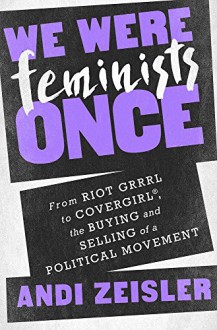
(Warning: this review is super long)
I received an ARC of this title from the publisher via Netgalley, in exchange for an honest review. It is scheduled to be published for wide release May 3, 2016.
The title We Were Feminists Once: From Riot Grrrl to CoverGirl, the Buying and Selling of a Political Movement sounds like a pretty straightforward condemnation of the sea change that has taken place in American culture regarding feminism. But as with all political movements, nothing is ever simple.
Feminism has become a buzzword. It garners clicks for celebrity interviews and can sell anything from building blocks to underwear. How has a word so long associated in the mainstream consciousness with angry, unattractive malcontents become a marketer’s dream? This is the convoluted journey Andi Zeisler tackles in We Were Feminists Once. There are many paths to trace in the search for the shifting meaning of a political movement, but one thing is for sure: they almost always lead to money.
Zeisler, former riot grrrl and one of the founders of Bitch magazine, turns a harsh lens on the many industries that have coopted a political movement about equality in order to strip it for parts and make a profit: the fashion industry, Hollywood, the Internet and social media, even food and soap brands. When once it was a real challenge to find almost any female role models in the realm of popular culture, it’s now all too easy to choose among Strong Female Characters in various bland, marketable flavors. Food companies that once appealed “family values” now peddle female empowerment in a jar. Celebrities who have distanced themselves from feminism and its “anti-men” clichés now clamor to endorse it and adopt it into their personal brand. The pendulum swings from one extreme to the other; the middle ground passed through only to get from point A to point B.
We are seeing a rise in interest in gender parity and diversity in film, television, advertising, politics, and other public arenas, but are we seeing any genuine gains in this inclusion? With marketing smoke and mirrors it is really hard to say. If you go to Buzzfeed and type “feminist” into the search box, it will return with dozens of lists and articles with titles like “40 Things Only Internet Feminists Will Understand” and “15 Reasons Taylor Swift is Secretly a Feminist.” But, you may ask, isn’t this visibility a good thing? This is where it gets the most complicated, as the answer is both yes and no. The increasing visibility of feminism makes it feel open to more people and a wider discourse, but at what cost? Usually, as Zeisler makes increasingly clear, the cost is substance and legitimate political engagement.
Feminism is not the only buzzword that is rapidly losing meaning as its use increases. Another casualty Zeisler chalks up to the linguistics of marketing is the word “empower.” Once a signifier of self-sufficiency in the under-served and underprivileged, it can now be tacked on to anything woman-related. Have you ever been empowered by lipstick or deodorant? Well, now you can be. In 2003, The Onion announced “Women Now Empowered by Everything a Woman Does,” and the marketing chant of empowerment continues to ring in our ears more than a decade later. As Zeisler points out, “[advertisers] use the term as an all-purpose adjective, Mad Libs-style; pop it anywhere in that sentence, it’ll make sense.” And the overuse of the word isn’t the most troubling aspect of its saturation; rather, the gendered way it allows people to talk about women and power without using the actual word power is the really frightening bit.
The market’s embrace of feminism is riddled with cynical strategy. One of many of Zeisler’s examples: in order to be seen as a company that cares about women’s issues, CoverGirl cosmetics donates (loudly and visibly) to breast cancer research, while making no effort to ensure their products are free from known carcinogens. This is where the façade breaks down and feminism becomes just another tool. Are there companies that legitimately care about women’s issues? Sure, but the sheer volume of the market drowns them all together into white noise and leaves us to dig for the truth among the competing and contradictory sounds.
The capitalist marketplace adoption of feminism and the systematic devaluation of it as a movement are both tied to a very particular permutation of commercial feminist values: the idea of “choice feminism” (also known as white feminism). The market is all about choice (or at least the illusion of it) and feminism, in its mainstream-embraced version, has followed suit. It seems that every choice, Zeisler highlights, can be considered feminist if made by a (self-proclaimed) feminist. There is no wrong way to be a feminist! You want to be a stay at home mom? Feminist! You want to work? Feminist! You don’t have an option because you’re poor? Uh…feminist? Choice is a privilege that comes from having options—a privilege bought by feminist organizing and activism—that now negates that activity by reframing it as choice. Choice feminism mirrors capitalism in a disturbing way: trickle down theory fails in both arenas, and yet we keep treating it like it works.
To say there is only one way to be a feminist is categorically wrong. But to say that there is no wrong way to be a feminist is equally misleading. As Zeisler notes “[m]arketplace feminism is seductive. But marketplace feminism is not equality.” And ours is not the first generation to “market” feminism with an eye to the mainstream. Near the end of the book, she breaks it down with harsh truth:
“The feminist movements we’re all most familiar with are ones that were able to be easily understood by outsiders with a minimum of difficulty. Optics mattered: First-wave feminists didn’t want the presence of women of color to put the kibosh on getting suffrage; second-wave feminists didn’t want lesbian and transgender women “tainting” the movement with fringe identities. Both movements were selling a branded image to wary buyers.”
This buyer’s-market sensibility creates an environment of exclusion that has continued to plague feminism from its beginnings to the present day. People of color and LGBTQ individuals still find themselves often on the outside of mainstream feminism, despite the attempts made to bring intersectional feminism forward, and marketplace feminism entrenches the problem further by forever appealing to a mass audience of mostly white buyers with disposable income. In other words, using feminism as a commodity makes it more palatable for the masses but ineffective for those who need it most.
So should we throw away our “This Is What a Feminist Looks Like” t-shirts? Despite her unflinching dissection of the problems inherent in using feminism as a marketing tool, Zeisler is not immune to the charms of seeing feminism portrayed positively in the media; representation matters, after all. Hers is not an all or nothing argument, but rather a call to do what good consumers and activists should always do: look for the truth behind the ad copy and don’t buy everything the media tries to sell you. If “[f]eminism these days really does look brighter and funnier, cooler and easier than ever before” you must also remember that
[t]he problem is—the problem has always been—that feminism is not fun. It’s not supposed to be fun. It’s complex and hard and it pisses people off. It’s serious because it is about people demanding that their humanity be recognized as valuable. The root issues feminism confronts—wage inequality, gendered divisions of labor, institutional racism and sexism, structural violence and, of course, bodily autonomy—are deeply unsexy.
What comes after our current climate of marketplace feminism? “Postfeminism” as a concept came to the fore in the 80s, to suggest that feminism was over and we had “won,” since we had a few token females in the major fields and more empowerment than we knew what to do with. If we can’t actually be post-feminist—and we certainly can’t anytime soon-- Zeisler hopes we can instead embrace post-marketplace feminism. To sum up, she gives us this:
I want idealism to be more than a passing fad. I want feminism to be meaningful long after no one is singing about it, or name-checking it on red carpets, or printing it on granny panties…. A post-marketplace-feminism world may not be as headline worthy, but it will be a world that benefits more than a commercially empowered few.
I’ve always considered myself fairly knowledgeable about feminism and how easily the media warps women’s issues for it’s own purposes, but We Were Feminists Once uncovered facets of the current state of things that I have been blind to and articulated sentiments I have not been able to put my finger on. I’ll be the first to admit that I’m a sucker for all that clickbait about feminist comebacks and however many times feminists did something on Tumblr. These things don’t necessarily need to go away—most are simply for laughs and internet solidarity. But while we’re laughing and patting celebrities on the back for making feminist statements, we also need to be legitimately engaging with equality (and the lack thereof) in the real world.
We were feminists once. So let’s be feminists again.
If you are looking for a sexy, boozy, D&D-inspired, lady-centric adventure comic (and who isn’t?) then Rat Queens is where it’s at.
Betty, Dee, Hannah, and Violet are a quartet of baddass adventuring blades-for-hire, who generally cause more trouble than they fix. The Rat Queens:
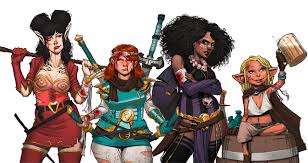
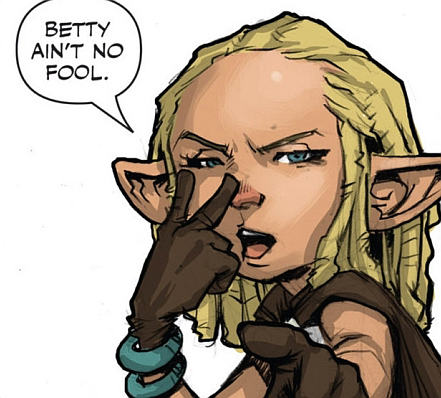
(I told you.)
Sent out to clear a goblin infestation as punishment for yet another drunk and disorderly arrest, the Queens instead find a shadowy, and somewhat ineffective, assassin. One fortuitous, but really gross, troll intervention later, and the ladies are off to find out just who the hell would want them dead. Since the list is actually kind of long, they have to do a bit of digging, while also defending the town from the revenge of an angry troll girlfriend. Between the drinking, the mind-altering substances, family and romantic drama, and bloody altercations, the Queens still manage to uncover a sinister plot and (kind of) save the town of Palisade and their own asses.
As someone who has played D&D for years and read fantasy novels since childhood, Rat Queens is just perfect. Wiebe and Upchurch take the best elements of role playing and cut out the self-serious, faux-medieval nonsense and get straight to great storytelling and compelling characters. The Queens, though falling into the race/class categories typical of Forgotten Realms-type storytelling, are not empty tropes, but people. Awesome, flawed, complicated people. The world is built of pure fantasy and is full of glorious, hilarious anachronism: a relic infused with dead souls that is basically a magical cell phone, drinks served in martini glasses, tunics styled like band t-shirts. The art is absolutely gorgeous, from the character designs to the tiny background details. But the best part is the pure, unadulterated ATTITUDE:
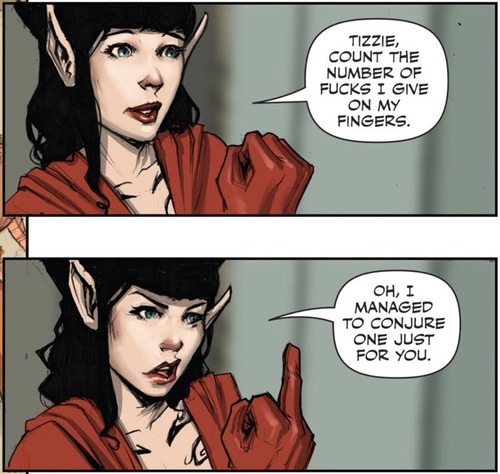
Oh yeah, and it's not for the kiddies.

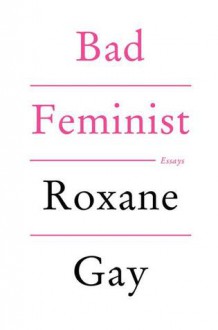
It used to be that you could only really know a writer through their work, and perhaps the odd interview. Now we can watch our literary idols stick their feet in their mouths in real time (coughAnneRicecough), thanks to Twitter, Tumblr, Facebook, et al. Social media has done more than connect us to share pictures of cats and misogynistic screeds about “ethics” in things, it allows us to watch entire lives unfold, ask questions of people we will never meet in the real world, and follow and discuss work with writers while it is still being written.
I follow Roxane Gay on Twitter and see her on Tumblr. I read her articles/reviews all over the web. I “know” her, in that superficial, not-real-but-feels-real way that social media provides. And yet I wouldn’t need any of that stuff to know her, because I’ve read Bad Feminist. That sounds presumptuous, but what I mean is that she puts so much of herself into these essays that it is like she is right there, speaking to you. Gay is the kind of critic I would like to be; she doesn’t shy away from the personal, or try to keep the first person out of her critique. Too many critics I find myself admiring for their apparent skill are actually rather cold and academic, and their voices often slip into my work. Objectivity in art is all well and good (I went to art school, I get it), but we feel things when we read stories, or watch films, or look at art of any kind, so why do so many people think they can approach these things without their own feelings or experience? Gay doesn’t, and I want more of that in my life.
I am also a bad feminist. I make more money than my husband, and yet I can’t seem to give up the reins a little and let him help me more around the house, and then get angry when he has time for fun and I don’t. I shave my legs and read pulpy old sci-fi (if you’re familiar with it, you know where the problem is). I don’t pay enough attention to the issues surrounding women who are not like me. I don’t stand up and talk back when I get catcalled or told to smile because it would make me “prettier.” Most of my favorite books and television shows still revolve around men. This is just the tip of the iceberg, but you can see where I’m coming from. But like Gay says in this very book: better a bad feminist that no feminist at all.
The essays collected in Bad Feminist have been published in other places, but unlike most collections of previously available work, I never got the impression that these were just bundled together. It is true that the essays are not just about feminism (bad, good, or otherwise) but race, ambition, politics, memoir, literature, film, television. About life. And when you’re a feminist, these things are all related, because feminism is about more than being female and making certain demands. It’s about creating a world where inequality of all kinds is explored and –maybe someday, dear god maybe- rectified. It’s about looking at the way the media portrays everyone, men and women and everything in between, and how these portrayals pigeonhole us, lessen us, or how they don’t. It is many things trapped in a word with so much cultural baggage, it is impossible to define from one individual to another. My feminism probably isn’t your feminism, but it doesn’t make either any less valuable.
Self-proclaimed feminist or not- and I hope you are- you should read this. Seriously, like, now.
Also, Gay and I had identical reactions to The Hunger Games. Team Peeta 4eva.
(Cross-posted at Goodreads: Bad Feminist)